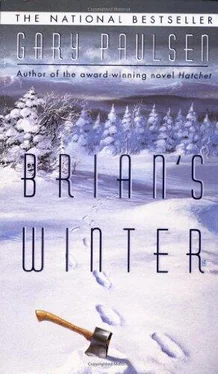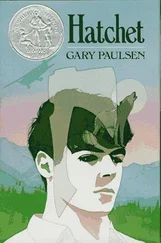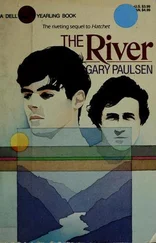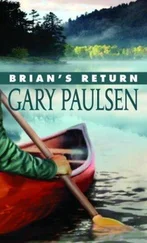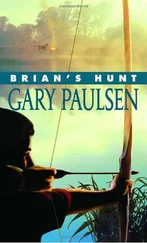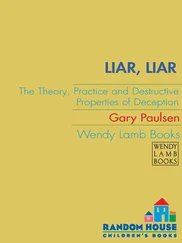From my brain, he thought, from my brain through my arm into the bow and through the string to the arrow it must all be one, and it is all one.
Three more times he shot and the arrows drove into the center of the hummock and then he was satisfied.
He left the camp again, put the sleeve quiver made from his old windbreaker on his right shoulder and walked slowly, watching, listening until he saw the curve of the back of a rabbit near a small clump of hazel brush.
It was too far for a shot and he quickly averted his eyes and froze for a moment before moving closer. He’d learned much from the woods, from mistakes, and one thing he’d come to know was that game spooked if it “felt” that it was known. It was always better to look away, move sideways instead of directly toward it, and he worked now to the left, letting the brush cover his movement until he was no more than fifteen feet away from the rabbit.
He drew the bow, aimed for the center of the rabbit and released when he felt the arrow would fly right.
It took the rabbit almost exactly in the center of its chest and drove through cleanly, killing it almost instantly.
They were not all this clean, the kills, and he was grateful. He had not grown accustomed to killing in spite of how much of it he had done.
He had learned this: Nothing that lived, nothing that walked or crawled or flew or swam or slithered or oozed — nothing, not one thing on God’s earth wanted to die. No matter what people thought or said about chickens or fish or cattle — they all wanted to live.
But Brian had become part of nature, had become a predator, a two-legged wolf. And there was a physics to it, a basic fact, almost a law: For a wolf to live, something else had to die. And for Brian to live it was the same. His body was a machine, it needed food, needed calories, and for that to happen something had to die. But sometimes it did not go well. Sometimes the arrow did not hit a vital place — did not hit the heart or lungs — and the rabbit or grouse died more slowly. The first time this had happened a kind of panic had taken him. He had shot a rabbit through the middle, the stomach, and it had tried to run and then had flopped around and he had shot the rabbit again and again, pounding arrows into the poor thing until it had at last died and when he’d cooked it and eaten it — as hunger forced him to do — the rabbit had tasted like wood and made him so sick he nearly threw up.
It was the only thing he had liked about the rifle. It killed quickly, caused a kind of wound shock that stunned as it killed.
But he was once more with the bow now and the silence of it brought him back to being more a part of the woods and he moved easily as he carried the dead rabbit back to camp.
It was afternoon by the time he had the fire rekindled and had set to cleaning the rabbit. Much had changed since he had retrieved the survival pack from the plane. He had a hunting knife now, and that made cleaning game much easier and faster.
He still wasted nothing. He used the knife to split the rabbit down the middle of the belly and skinned it carefully and then gutted it, using the curve of the knife to clean out the cavity. The head and lungs and intestines and stomach and liver he set aside for fish bait and food, as well as the heart. Then he cut the body up into pieces, carving it at the joints, and put them in a pot with fresh lake water, which he set on the fire to boil. He had found it best to boil everything. Initially he had cooked meat over the fire on a stick — something he had seen in movies and on television — but it was the wrong way to cook. The flame heated the meat and all the juices — all the vitamins and nutrients — dripped into the fire. Everything was wasted. But by boiling the meat he made a stew and when he drank the juice-broth he not only had a rich soup but something to sip as well.
He leaned back against the rock wall next to his shelter opening and took a minute to think while the meat cooked. It amazed him how little time he had to do that — sit and think. It seemed the longer he was in the woods — he had marked sixty-eight days counting this day — the more there was to do. Firewood was an endless chore of course — he kept the fire going whenever he was there and banked it when he left. And since he had burned all the easy wood, the wood close to camp, it took longer to bring wood in. But that wasn’t all of his life and it seemed that everything he had to do doubled.
He would get up, check his fishing lines, and remove any fish to store in his live-fish pool along the shore. Then see to airing out the sleeping bag and tend to his toilet and hunt for the day’s meat and clean it (if he made a kill — he often did not) and cook it and stretch the hide (if it was a rabbit) to dry and eat and bank the fire for night and another day was gone…
Just stopping to sit and think was a rare thing. At first he didn’t like it much because it brought memories and made him homesick, made him miss his mother and father and other life. But now he relished the time, and he spent it this day doing something he called “visiting.” He would pick somebody back in what he thought of as “the world” and sit and have an imaginary chat with him or her. Usually it was his mother or father, sometimes a friend and once or twice a movie or rock star.
Initially he worried that he might be going crazy. But then he decided if you felt you were crazy you weren’t really crazy because he had heard somewhere that crazy people didn’t know they were insane. So he went ahead and had the visits.
He sat now and visited with his mother. By looking across the lake and letting his eyes go out of focus he could visualize her face, hear her laugh, and he sat chatting in his mind with her, asking how she was doing, telling her of his life now, and before long he was surprised to see that the meat had cooked.
Brian took the pot off the flame to cool and went down to check the fishing line. There was a small panfish on it — it had blue gills — and he took it off the hook and put it in the holding pen with the others. It was his only “saved” food, the little pool of fish, and no matter how small the fish, he kept them all. He had learned that as well — food was everything. Just everything. And none of it, not even the smallest fish, could be let go.
When he arrived back at the shelter the meat and broth had cooled and he ate quickly. Flies had come when he gutted the rabbit and they stayed for dinner while he ate. He brushed them away as he ate the meat from the bones and drank the broth, a full quart. They followed him as he went back to the lake to clean the pot and only left him when there wasn’t a smell of food anywhere in the area.
He stacked wood for the night fire and made his bed by restacking the mattress of pine boughs and unrolling the sleeping bag and foam pad, and here he got another warning that he ignored. When he slid into the bag and turned so that he felt the heat from the fire on his face coming through the opening it did not feel uncomfortable. He snuggled down into the bag and felt glad for its warmth, and the thought that this was the first time he’d felt glad for heat this season — that it was growing colder — somehow eluded him.
He closed his eyes and went to sleep like a baby.
For two weeks the weather grew warmer and each day was more glorious than the one before. Hunting seemed to get better as well. Brian took foolbirds or rabbits every day and on one single day he took three foolbirds.
He ate everything and felt fat and lazy and one afternoon he actually lay in the sun. It was perhaps wrong to say he was happy. He spent too much time in loneliness for true happiness. But he found himself smiling as he worked around the camp and actually looked forward to bringing in wood in the soft afternoons just because it kept him out rummaging around in the woods.
Читать дальше
